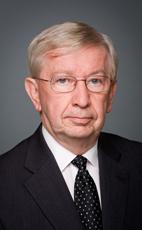Before resuming debate, the Chair wishes to make a ruling on the motion by the member for Saanich—Gulf Islands on a point of order earlier today.
Having delivered a decision on the selection of report stage motions for Bill C-59, an act to implement certain provisions of the budget tabled in Parliament on April 21, 2015 and other measures, the Chair would like to address the concerns raised by the hon. member for Saanich—Gulf Islands concerning report stage motions Nos. 49 and 116, standing in her name on the notice paper.
I would like to thank the hon. member for having raised this matter, as well as the hon. Leader of the Government in the House of Commons for his comments.
The member's main point of contention is that her proposed amendments could not have been presented before the deadline adopted by the Standing Committee on Finance because they flow directly from witness testimony that took place after the deadline passed.
As evidenced by first having written a detailed letter and now having raised the matter again in the form of a point of order, the member for Saanich—Gulf Islands clearly feels that she was not provided an opportunity to have certain amendments considered by the committee. She feels this circumstance is exceptional, and on that basis, the House as a whole should decide whether Bill C-59 should be amended in the fashion she is proposing.
In deciding the matter I must be guided by our long-established practice in relation to the Chair’s authority to select report stage motions. A note to Standing Order 76.1(5) says:
The Speaker will not normally select for consideration any motion previously ruled out of order in committee [and] will normally only select motions that were not or could not be presented in committee.
At page 783, the authors of House of Commons Procedure and Practice set out the general principle with respect to the selection of report stage motions:
As a general principle, the Speaker seeks to forestall debate on the floor of the House which is simply a repetition of the debate in committee. [T]he Speaker will normally only select motions in amendment that could not have been presented in committee.
Both these excerpts point to an essential truth about report stage: mainly that it is not meant to be another opportunity for detailed consideration of the clauses of the bill. For this reason, the Chair rigorously limits the types of motions that could be considered at report stage. In so doing, the Chair rests on the presumption that a committee's clause-by-clause consideration provides ample opportunity to scrutinize the clauses of the bill and have amendments considered accordingly.
The Chair is not convinced by the argument that the rationale for selection of report stage motions can be rooted so exclusively in anyone's particular testimony and qualify as an exceptional circumstance that the Chair ought to consider.
While the Chair understands the member's specific argument about deadlines with respect to submissions of amendments for Bill C-59, I also know that committees have shown great flexibility in the past, not only about deadlines, but more generally in how they consider amendments in clause-by-clause. In fact, one such example of that flexibility is the very process that committees adopted, allowing members of non-recognized parties to have their amendments considered in committee.
I know the member for Saanich—Gulf Islands is one of the more active members of this place when it comes to clause-by-clause. In this regard it would have helped establish for the Chair the degree to which it truly was impossible to have these amendments considered in committee. If she had pointed to demonstrable attempts to bring before the committee her amendments, her arguments might have been more persuasive.
As such, the Chair cannot agree with the member for Saanich—Gulf Islands and finds that Motions Nos. 49 and 116 should not be selected on the basis of exceptional significance. I would like to thank the hon. member for having raised this matter.
Resuming debate, the hon. Parliamentary Secretary to the Minister of Canadian Heritage.

